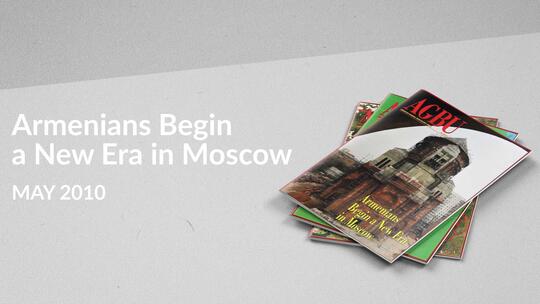Not many in Moscow know Arman Jilavian by sight, but many are well acquainted with his Yerevan magazine—the first media project in Russia for an ethnic minority.
Founded in 2005 and published in Russian, the slick magazine has editorial offices in Yerevan but its marketing and its biggest readership is in Moscow where most of its 140,000 copies are sold. In total, it has about 240,000 readers in Russia, plus an English version is printed in 10,000 copies for distribution in the United States, where its newsstand price is $6.99. The magazine typically features cover stories that profile famous Armenians around the world. The spring 2010 issue, for example, profiles tennis legend Andre Agassi.
"Our goal was to create a magazine that would be an object of pride for Armenians, with the possibility of competing with numerous high-quality publications in Moscow," says Jilavian, whose magazine has proved that a media ethno-product can find success in the multi-ethnic Russian capital.
Mediacrat, a company set up by Jilavian in 2005, is managing the quarterly, which plans to expand to a bi-monthly.
Besides Yerevan, Mediacrat Media Holding's portfolio includes several other commercial and corporate publications with a print run that exceeds 12 million copies. Mediacrat implements the whole spectrum of media services, beginning from developing concepts, content, plus publication and distribution.
"The media market of Moscow is very saturated and competitive, and large investors are necessary in order to launch a successful media project," says Jilavian. Mediacrat is one of several businesses under the holding of businessman Ruben Vardanian's Troika Dialogue.
"Publishing one magazine is not a lucrative business; therefore from the very outset Mediacrat was designed to fill the market, providing the whole spectrum of services in the sphere of marketing, media and advertisement," Jilavian says.
Jilavian, 32, is a graduate of the Journalism Department of Moscow State University. He visits Yerevan frequently, but says he has no immediate plans of setting up a similar holding in Armenia.
He does hope, though, that through Yerevan magazine Armenians worldwide will be attracted to the homeland.
"Many would dream of living in Armenia, if they had an opportunity to find a job. The myth that everything is inexpensive in Yerevan has long been shattered. Prices in many spheres of services, beginning with air tickets, accommodations and rest in a local spa or resort, compete with European prices," he says.
The small print under the banner of Yerevan calls it "a magazine with an accent." Throughout Moscow itself Armenian is spoken with an accent reflecting the many different destinations from which this Diaspora has been drawn. But the fine print also has a broader application.
"I constantly hear slogans in Armenia that we are ‘one people, one culture,' which, I think, has become obsolete and is much like the slogan that says that ‘our strength is in our homogeneity.' I think that the phenomenon of the Armenian potential should be expressed not in the similarity of ideas, but in their diversity and competition. Armenia needs new, fresh ideas that could be brought in by Armenians from outside," says Jilavian.






